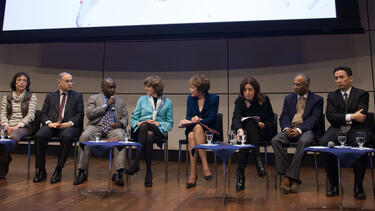Faculty Viewpoints
Women as Bosses Still Face Bias
In a New York Times op-ed, Professors Victoria Brescoll and Jeffrey Sonnenfeld write about the gender bias and discrimination that persist for powerful women in corporate America.
Classroom Insights: Lessons from the First Stock Bubble
Each time it happens, it seems in retrospect like people have lost their minds, and that such widespread madness could never happen again. And then it happens again. Yale SOM professor William Goetzmann looks back at an investing mania from the 18th century to better understand the forces that can create such distortions.

How Should Business Schools Prepare Students for a Global Economy?
What skills and knowledge do future leaders need to navigate an ever-shifting global economy? And how is the mission of business schools changing in response?

What Should Finance Do for Society?
The financial crisis of 2008 is a looming figure in current economic thinking. The global economy is still slowly recovering from the shock, and policymakers and academics continue to discuss the structural changes needed to prevent a recurrence. The stress of the last half decade has made two things very clear: A productive and innovative financial system is essential to the broader economy, but financial innovations made irresponsibly—without consideration of systemic risk and other impacts on society—can wreak havoc.
Can We Prevent Future Crises?
Was the 2008 financial crisis a one-time event or the first example of a new pattern? Professor Gary Gorton argues that the history of banking shows that there’s a real risk of future upheaval in financial markets.

What Should We Understand about Urbanization in China?
The scale of urbanization in China is without precedent in human history. The transformation is also complex and nuanced, says Yale’s Karen Seto, with cities taking different approaches to environmental issues, pace of development, and global connections.

What’s Ahead for Financial Markets? An Interview with Robert Shiller
Nobel laureate Robert Shiller discusses some of the trends he currently sees in finance and the housing market.

Why Do We Need Experts?
Today’s political and cultural debates reflect a lack of consensus not just on policy but on the facts themselves—and on who is qualified to judge the truth. Robert C. Post, the dean of Yale Law School, argues for an approach to free speech that preserves the role of expertise.
Merkel’s Almost-But-Not-Quite-Decisive Victory Is Bad News for the Eurozone
With Germany at the center of the Euro crisis, the country’s recent national election has the potential to affect what happens far beyond its borders. Professor David Bach, Yale SOM's senior associate dean, teases out the implications of Angela Merkel’s big—but maybe not big enough—win.
Where Will China Go Next?
China faces an immense challenge: it needs to continue growing its economy while shifting away from the manufacturing-led model that has fueled its growth in recent decades. At the same time, it has to address concerns over pollution, income inequality, and other social issues. Yale’s Stephen Roach argues that the rest of the global economy has a stake in whether China can successfully shift gears.
